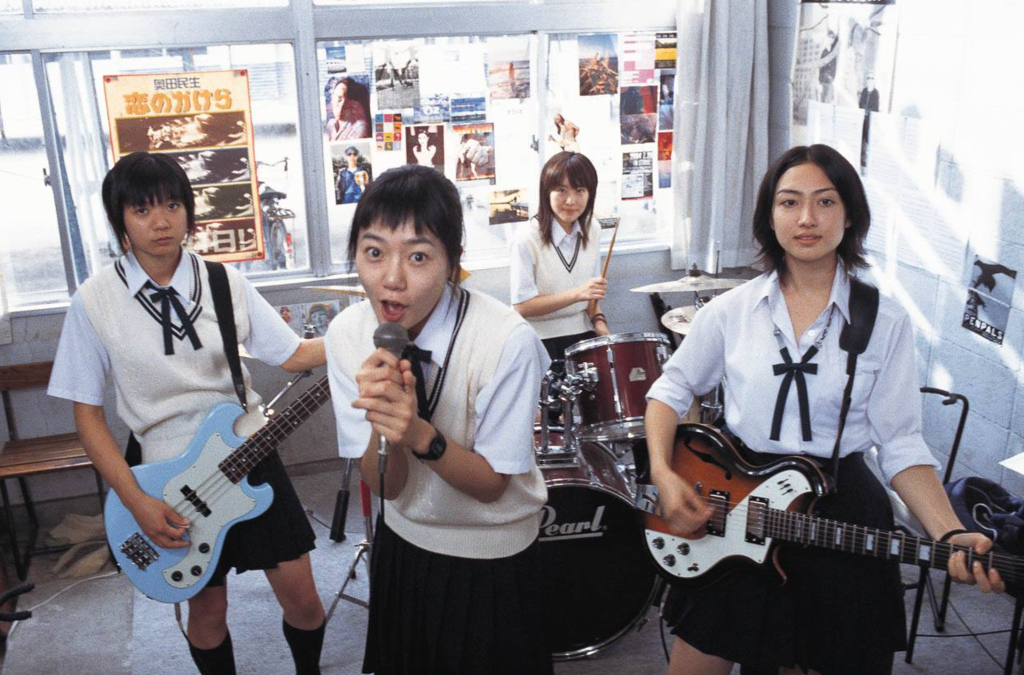The key members of the band Linda Linda Linda (2005) centers around love the punk group the Blue Hearts so much that, in their inchoate days of part-time musicianship, the latter’s output is the only one they’ll entertain covering. (This quartet of schoolgirls, which calls itself Paranmaum, hasn’t yet reached its “playing originals” phase.) Nearly all of the film revolves around the teenage foursome trying to perfect the Blue Hearts song the movie gets its title from. The goal is to play it, and potentially a couple of others, for a school concert that, when the film opens, is just three days away.
It’s a big task, considering that, just before Linda Linda Linda starts, Paranmaum’s frontwoman got into a fight with the guitarist — a tift leaving the latter with a hurt hand and leading the former to quit the group entirely. The band’s keyboardist (Yuu Kashii) takes over on guitar, even though she’s never played the instrument before. A Korean exchange student at the Japanese high school where most of the film is set named Son (Bae Doona) is recruited as the lead singer. Never mind that she can barely speak Japanese and isn’t musically inclined.
A narrative like the one Linda Linda Linda is animated by creates some expectation of a conventionally feel-good unlikely-band-success story à la the two-years-younger School of Rock (2003). Linda Linda Linda certainly makes you feel good, and the inexorable success Paranmaum eventually finds does at one point feel unlikely. But you never detect director Nobuhiro Yamashita, who co-wrote the film with Kōsuke Mukai and Wakako Miyashita, trying to steer you any particular way or establish a particular tone. Preferring things unfurl more naturalistically, scenes are usually shot with cameras that hardly move, at medium-shot distance. Takes are long. It can feel, a little, like Yamashita is surveilling the girls, most interested in capturing the day-to-day mundanity that fuels their passion more than bores them.

Yû Kashii, Bae Doona, Shiori Sekine, and Aki Maeda in Linda Linda Linda.
Basking in the humdrum establishes a respect for the seriousness with which these girls are taking a pursuit that others might write off as dilettantish. It also dispels the veil of cool and glamor — and undergirds the oft-repeated idea of people coming together and playing music as a kind of miracle — one might associate with being in a band. There are perks, but it’s mostly just hard work that would be more sapping if there weren’t a love for the craft, and for each other, helping preserve the energy. (But it is definitely sapping: in the later stretches of Paranmaum’s unrelenting, almost literally 24/7 work to get into performance-ready shape, it’s not uncommon for its members to accidentally fall dead asleep when they have a moment to themselves.)
Played by, in addition to Doona and Kashii, Aki Maeda and Shiori Sekine, the band’s members are mostly only known on the surface to us. The artistic commitment they’ve made takes up too much of Linda Linda Linda’s space for there to be very much time spent inside their inner lives, examining the hopes and dreams they imagine once outside the walls of their school. But there are some lovely moments of respite — usually over dinners they’ve assembled after an exhausting day — where they enjoy each other’s company, only underscoring how much affection we’ve come to have for them. Son is particularly touching: you sense how pleasantly surprised she is to find herself good at something she’s never thought twice about, and can’t help but be a little frustrated for her that she can’t communicate as well as she’d like with her new friends. She also grounds one of the film’s funniest scenes: one where a guy who has a crush on her professes his love and she seems to basically short-circuit.
One wonders whether Paranmaum will continue to build on their inevitable triumph at the end of the film. But whether bandom would prove a short-term interest or a long-term fixation doesn’t abate the thrill of their anticipated success. It’s so infectious that it’s no surprise that the movie would prove influential in a tangible pick-up-a-guitar kind of way: it became a primary reference point for the Linda Lindas, an L.A. quartet of girls whose oldest member was 13 upon forming. It’s nice to think of them as carrying a torch Paranmaum unwittingly lit.
